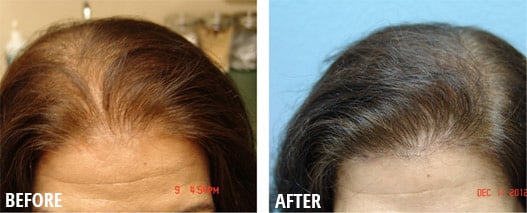Table Of Content

There’s no outright way you can “prevent” balding, but there are steps you can take to halt any further loss of hair on your scalp. Poisons that can cause hair loss include arsenic, thallium, mercury, and lithium. If you ingest a large amount of warfarin, which is found in rat poisons, it can also cause hair loss. Taking large amounts of vitamin A or selenium is also toxic and can cause hair loss.
Common symptoms
Male-pattern baldness typically appears first at the hairline or top of the head. If you’re looking for a hair growth boost, these products may just do the trick. While many can help improve hair health, they rarely get to the root of the problem.
Medications to treat hair loss
Does rosemary oil for hair growth really work? We asked 3 dermatologists to find out - CNN Underscored
Does rosemary oil for hair growth really work? We asked 3 dermatologists to find out.
Posted: Thu, 11 Jan 2024 08:00:00 GMT [source]
Some people pull on their hair, often to relieve stress. It's not easy, but try to come to terms with your hair loss. One way to do this is to make a list of all your good qualities and focus your energy on celebrating these attributes.
Matt Leavitt Shares His Pearls for Hair Loss Treatments at Fall Clinical - Dermatology Times
Matt Leavitt Shares His Pearls for Hair Loss Treatments at Fall Clinical.
Posted: Mon, 22 Apr 2024 21:00:00 GMT [source]
How do trees and green spaces enhance our health?
When the treatment is stopped, hair loss will begin again within 12–24 weeks. It ranges from normal hair density to a bald crown, which is rare. The scale helps document female pattern baldness, a condition your doctor might call androgenic alopecia. You probably know it as male pattern baldness, but it affects about 30 million American women. Experts think genes and aging play a role, along with the hormonal changes of menopause. Your hair could thin all over, with the greatest loss along the center of the scalp.
There are several types of hair loss, and it can affect adults of any gender and even children. You may lose hair just on your head or from your body as well. It's typical to lose some hair every day as part of your hair’s usual growth cycle. For most people, the lost hair grows back, and you maintain a full head of hair. But illness, hormonal changes, stress, aging and inherited conditions can interfere with your hair’s growth cycle.
Recommended for You
Most people lose anywhere from 50 to 100 strands of hair each day, according to the American Academy of Dermatology. On days you wash your hair, you might lose up to 250 strands. A hair transplant is usually not covered by insurance. The cost (often thousands of dollars) is prohibitive for most people. With new techniques, many women benefit from hair transplantation surgery. But there are risks, including infection or shock that can cause hair to fall out of the transplanted areas.

How does stress affect hair?
Free to everyone, these materials teach young people about common skin conditions, which can prevent misunderstanding and bullying. Hair loss can sometimes be a sign of an underlying disease. Topical tretinoin (Retin-A) is sometimes used in combination with minoxidil to treat androgenic alopecia.
When to see a doctor
Hydrocortisone 1% is available over-the-counter—anything stronger requires a prescription. For symptoms of extreme inflammation, including stinging and acne-like bumps around the base of the hair, it’s a good idea to see a dermatologist. Depending on the severity, they may recommend corticosteroid injections for additional relief, she adds.
Some types of hair loss can eventually lead to baldness. Most healthy people lose up to 100 strands of hair per day. As part of your hair’s growth cycle, new strands grow and take the place of the ones you shed. You can often resolve nutrient deficiencies with dietary changes or supplements, though it never hurts to get guidance from a doctor or registered dietitian first. A trained healthcare professional can help identify and treat nutrient deficiencies caused by an underlying medical condition. If you notice hair loss, talk to your doctor as soon as you can.
When a man has hereditary hair loss, the first sign is often a receding hairline or bald spot at the top of his head. In women, the first noticeable sign of hereditary hair loss is usually overall thinning or a widening part. It can take the form of "thinning" or involve a total loss of hair. It can be gradual or sudden; it can affect the old and the young.
For women who are experiencing a receding hairline (frontal fibrosing alopecia), talk with your doctor about early treatment to avoid significant permanent baldness. Although reducing your stress levels might seem insurmountable, making sure you’re eating the right things will go a long way to setting a good foundation for optimum hair growth. A healthy balanced diet is also important in stress reduction too as it can support a healthy immune system, repair damaged cells and even reduce elevated cortisol levels. Getting enough protein in your diet is essential as it provides the building blocks for proper hair growth; meat, tofu, eggs, beans, grains, nuts, and fish are all good protein sources. Some studies suggest that telogen effluvium can also be connected to low levels of iron, so include iron-rich foods like leafy vegetables, lentils and liver where you can. If you like the idea of adding supplements to your routine, there are some which are specifically formulated to contain ingredients that increase hair thickness and health.
“Hair goes through cycles, where it grows and then falls out,” explains Ob/Gyn Lynn Simpson, MD. “So you should expect some shedding.” You can expect to lose between 50 and 150 hairs daily. SELF does not provide medical advice, diagnosis, or treatment. When these flakes mix with the oil that’s produced by the scalp, they can clog your follicles and impair the hair’s nutrient supply, which ultimately weakens its structure. Incorporating gentle, hydrating products into your hair care routine can also help strengthen your strands and improve texture.

No comments:
Post a Comment